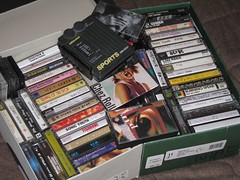 Via @lennysan, this is a great piece on how public, prosthetic memories will change us forever. Humans forget things with good reason: forgetting lets us discard old ideas in favor of new ones, and pain recedes so we can try things like childbirth again. Not so digital memory.
Via @lennysan, this is a great piece on how public, prosthetic memories will change us forever. Humans forget things with good reason: forgetting lets us discard old ideas in favor of new ones, and pain recedes so we can try things like childbirth again. Not so digital memory.
There’s a growing movement to put a statute of limitations on public digital data, even as Google reveals that it’s stored every search since its launch and the Library of Congress is archiving every Tweet.
As this Ars Technica piece points out, “in an age of ever-cheaper storage, the data committed to machine memory requires an act of will to delete.”






 @
@ Tags:
Tags: 






 Like all images on the site, the topic icons are based on images used under Creative Commons or in the public domain. Originals can be found from the following links. Thanks to
Like all images on the site, the topic icons are based on images used under Creative Commons or in the public domain. Originals can be found from the following links. Thanks to